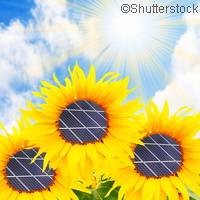
Transforming how and where we harvest power is essential for meeting the objectives set out in the Europe 2020 strategy.
One alternative energy source is printed-plastic solar technology: a new EU-funded project that has just got under way aims to advance this innovative technology, and design advanced flexible plastic solar panels that can be integrated into new consumer mobile applications and buildings.
The four-year long SUNFLOWER (‘Sustainable novel flexible organic watts efficiently reliable’) project is being boosted to the tune of more than EUR 11 million under the ‘Information and communication technologies’ (ICT) Theme of the EU’s Seventh Framework Programme (FP7). It brings together researchers from Belgium, France, Germany, Italy, Spain, Sweden, Switzerland and the United Kingdom.
The project partners aim to generate solar energy from highly efficient and recyclable printed-plastic solar panels: this electric power is safe, green and locally produced. Printed plastic solar cells are among the newest generation of technologies in solar power generation and result in solar panels that are flexible, low weight, and low cost. However, while this new technology has so far been a positive step in the right direction, there is still work to be done when it comes to improving the panels’ efficiency and lifetime.
The SUNFLOWER researchers believe this problem can be tackled by using large-scale printing machines to mass-produce the panels on rolls of flexible materials. This would be an improvement on the rigid, silicon-based panels in use today. By simultaneously increasing the cells’ efficiency and lifetime while decreasing production costs through environmentally friendly technologies, the project partners hope their work will bring us closer to a world where everyone can have access to environmentally friendly and efficient power.
Project coordinator Dr Giovanni Nisato from the Centre Suisse d’Electronique et Microtechnique (CSEM): says: ‘We have the chance to develop a technology that is ideally suited to manufacturing in the EU due to its high level of automation, need for highly trained personnel, low energy consumption, and close proximity to suppliers and markets.’
Flexibility, low weight, and low cost are the key advantages of printed plastic solar panels. They will enable the development of consumer applications like roll-up solar panels or panels integrated three-dimensionally into architectural structures, and will eventually make possible more economical and robust solar-panel fields for energy production farms. This is a key opportunity for the EU to further expand its innovation base in alternative energies.
The project consortium brings together industrial, institutional, and academic partners with the aim of getting solutions to market as soon as possible. The industrial project partners are well positioned along the supply chain of future products based on printed plastic solar cells, which is an important prerequisite for the creation of a substantial socioeconomic footprint for this project.



